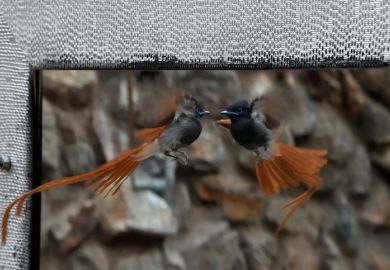The revamping of the Times Higher Education Supplement into a news magazine has attracted justified criticism for the woefully inadequate representation of academic women on its editorial board. Surely a magazine that claims to be at the cutting edge of news, analyses and debates in higher education could do better? The other big criticism of the first edition (10 January), that its letters page contributors were all male, also deserves attention.
Are the issues reported in the magazine of interest to women? Do they write in more when certain themes are featured? A glance at the letters page for 14 December 2007 reveals six female names. Was that a typical week? Definitely not, the letters editor tells me. On average, about 95 per cent of the letters received each week come from men. Why are female academics reluctant to put pen to paper?
Undoubtedly the pressured conditions of employment in higher education play an important part. Women academics in the UK are concentrated in lecturing posts rather than the professoriate, 84 per cent of whom are male. And lecturing posts carry a heavy administrative and pastoral load. Additionally, the pressure to publish and present papers encroaches on time and is especially hard for mothers with small children. As one 38-year-old mother said to me: "I have better things to do with my time than write to Times Higher Education." But is it more than this?
The press recently reported on work by Adrian Furnham, professor of psychology at University College London, who analysed the results of 25 studies of sex differences in IQ. His findings support the notion of what is known as the "male hubris, female humility" effect. Thus women tend to give significantly lower estimates than men of their own intelligence - by about five IQ points - while men tend to overestimate their brainpower. Men appear more confident, more willing to voice their opinions and think they are cleverer. Do these findings help also to explain the gender differences in letter writing to Times Higher Education?
Looking back to the 19th and 20th centuries, we find a tradition of women writing to the press, especially those active in radical movements such as Owenism, feminist and gay liberation and anti-militarism. Frances Morrison, born in 1807, whose unmarried mother was a Surrey farmhand, regularly sent letters signed "A Bondswoman" to The Pioneer. A committed Owenite and feminist, she demanded justice for her working-class sisters in paid work and education. "Sir ... It is time the working females of England began to demand their long-suppressed rights," she wrote in 1834. "Let us ... endeavour to throw off the trammels that have so long enshackled our minds, and get knowledge."
Similarly, the suffragettes in Edwardian Britain campaigning for the parliamentary vote used the media to plead their cause, despite the unsympathetic attitude of reporters and editors. The Manchester Guardian was the only newspaper to support women's enfranchisement, although its editor, C. P. Scott, favoured only the law-abiding suffragists who had been campaigning for 50 years.
When the suffragette Emily Wilding Davison died in June 1913 from injuries sustained after running on to the Derby race course to grab the reins of the King's horse, Scott condemned the "futility" of her action, praising suffragists who were "seeking honourably and sanely the enfranchisement which is their right". Author Evelyn Sharp wrote a stinging reply that Scott felt obliged to publish. "It is an insult, after the shameful record of the last half-century ... to expect women to go on 'seeking honourably and sanely the enfranchisement which is their right', when by honour and sanity you only mean submission and patience ... If men, after being tricked and set aside as women have been for fifty years, were to continue meekly to 'seek what is their right', you would say they were not worthy of the freedom they sought."
In the 1980s, the women campaigners against the nuclear airbase at Greenham Common frequently expressed their views in the press, despite condemnation from most rightwing editors. A war of words also arose within the wider peace movement about the effectiveness of their action. "As long as men still insist on being at the centre of everything that happens in our society, we'll still need women-only demonstrations," wrote one woman to The Guardian in December 1982.
And so we come to 2008 and Times Higher Education, a magazine that should not only reflect opinion about higher education, in all its diversity, but also form it. In this process of creating a more equal higher education, irrespective of gender, race or sexual orientation, women can and should play an important part, whether as letter writers, columnists or editorial board members.
Register to continue
Why register?
- Registration is free and only takes a moment
- Once registered, you can read 3 articles a month
- Sign up for our newsletter
Subscribe
Or subscribe for unlimited access to:
- Unlimited access to news, views, insights & reviews
- Digital editions
- Digital access to THE’s university and college rankings analysis
Already registered or a current subscriber? Login



